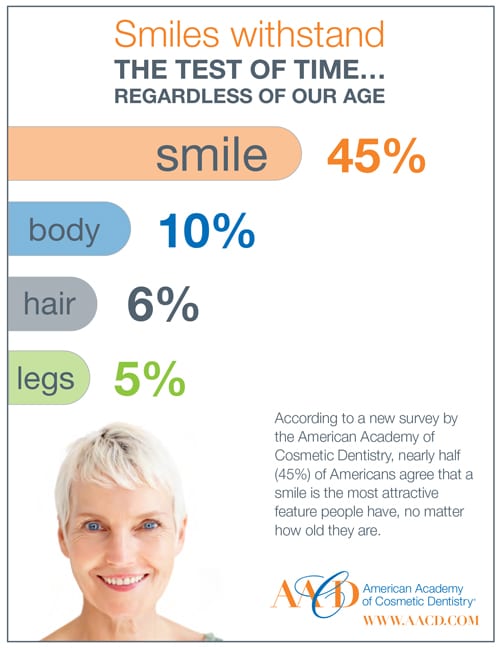Growing older is unavoidable, but that doesn’t mean your smile has to look old and dull. Philadelphia dentist Dr. Pamela Doray can help you keep a youthful looking smile and maintain a healthy mouth which will promote an improvement in overall health.

More Adults Are Keeping Their Teeth
Dentures are not an inevitable fate for aging adults…
More adults are keeping their natural teeth today than ever in the past. Dentists expect this trend to continue, improving the overall health and quality of life for adults in the future.
As you age, though, you may notice that your smile has teeth that are chipped, worn, or yellow. Often simply whitening your teeth will make your smile more youthful. Repairing chipped or worn teeth with bonding or porcelain veneers can also revitalize your appearance. Today’s dental porcelains are beautiful and may offer a solution for the replacement of older crowns and bridges that look dull and which may no longer match your other natural teeth. A smile makeover can be designed to address these and other issues which make you look older than you feel!
How to Maintain Oral Health
 In order to maintain health and vitality of your teeth, they must be routinely cared for with daily brushing and flossing and regular visits to the dentist. Preventive dental care is important at all ages. In fact, older adults may require more frequent visits to the dentist than their younger counterparts.
In order to maintain health and vitality of your teeth, they must be routinely cared for with daily brushing and flossing and regular visits to the dentist. Preventive dental care is important at all ages. In fact, older adults may require more frequent visits to the dentist than their younger counterparts.
There are many things you can do to maintain a healthy, youthful smile well into your golden years:
- Brush teeth twice daily using a fluoride tooth paste and floss once a day. Fluoride will promote healthy tooth enamel and prevent cavities. Flossing reduces the risk of gum disease, which can lead to tooth loss.
- Avoid tobacco and alcohol which are both risk factors for oral and throat cancers. Additionally, people who smoke or chew tobacco are seven times more likely to develop gum disease than non-smokers.
- Visit your dentist at least twice a year. The dentist not only checks the health of your teeth and gums, but can screen for oral lesions and oral cancer. It is important to visit the dentist prior to and throughout chemotherapy and radiation therapy to ensure optimal oral health.
- Let your doctor or dentist know if you are experiencing dry mouth. Many older adults take prescriptions and over-the-counter medications to manage chronic diseases. An unfortunate side effect of many medications dry mouth which can contribute to oral health problems such as cavities and gum disease. If no substitute medication is available, increase intake of water and chew sugarless gum to promote saliva production. Avoid tobacco, alcohol and nighttime sedatives which can further contribute to dry mouth.
With proper care and treatment you can have a natural, healthy & attractive smile for a lifetime.
